Reviewed by Glenn Erickson
Pricey movie disc sets are coming at us from all directions these days -- I guess a gift of a single movie is no longer particularly cool, but hitting somebody with hundred dollar plus collection is considered O.K.. Fans with one or two Spielberg movies on Blu-ray might find favor with this new Steven Spielberg Director's Collection, which gathers eight Universal titles from the former wunderkind, acknowledged master of the popular medium. Although Spielberg long ago became too big to have any 'obscure' movies to discover, fans unaware of his first decade's output are bound to be impressed. A twenty year-old state college student with connections might conceivably be hired to direct at Universal, but he couldn't get rehired and build up a powerful reputation with anything else than talent and drive. Spielberg had enough energy for three directors.
Several of the top Spielberg titles are here, but students of excellent direction will also be knocked out by Duel, which for complexity and precision on a short shooting schedule (13 days, I think I heard) would impress Edgar G. Ulmer. The collection is also an opportunity to reassess Spielberg's 1941. That all-star circus of comedy chaos could well find a new legion of fans.
Universal and Deluxe Digital have delivered eight titles in carefully curried & combed HD transfers. I'm pretty sure that several are reformatted existing transfers. 1941 is new to Blu-ray and comes with a special surprise. I think that Duel, The Sugarland Express and Always are here for the first time on HD as well.
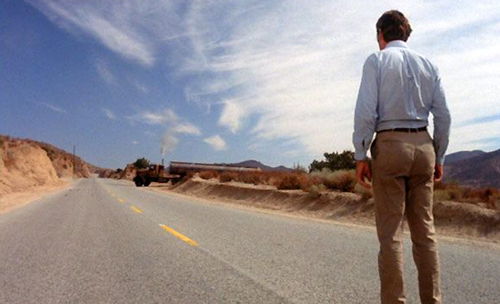
I don't know how ABC TV managed it, but by the screening night in 1971 it seemed like everybody I knew had been tipped off that Duel was something to see. I caught about twenty minutes, had to leave and rushed back to catch the end. I had seen and liked Spielberg's short subject Amblin' one year before at the Wilshire Blvd. Four-Star Theater, with Joe. Amblin' had been singled out for special mention in the L.A. Times, thus marking Spielberg for greatness, and in Duel the talent was obvious. Seeing the film today we of course still marvel at the tightly storyboarded action. Back in 1971 TV movies weren't keyed to a Hitchcock-like visual cutting pattern that told the story through reactions, subjective cutaways, and what professionals probably called ninety minutes of highly precise 2nd-Unit shot-grabbing. "The Kid" knew exactly what he was doing when he broke most of the rules for TV fare - wide-angle lenses, etc. Surprise, surprise, America not only could follow the story but sat nailed to the screen in suspense. Every viewer could relate to this extended short story of an Everyman citizen's battle with a killer truck on the Interstate. Commercial breaks were more unwelcome than ever.
I finally saw all of Duel for the first time on a big screen at a 1972 film program devoted to writers at the County Museum of Art. Richard Matheson was there (looking so young!) and praised Spielberg to high heaven. After fifteen years in the business, said Matheson, he'd never seen anything he'd written so well filmed. 1
Duel on Blu-ray is far better than even the 35mm screening I saw. It is, I believe, the longer feature version prepared for overseas and later revival use. Its widescreen framing (1.85:1) is an improvement over the old 1:33 TV copies -- everything is nicely composed. The extras from 2001 were produced by Laurent Bouzereau. Spielberg describes the methods he used to get the film in the can in such a short time. A second featurette talks about his TV career in general and a third allows author Richard Matheson to give his take on the show.
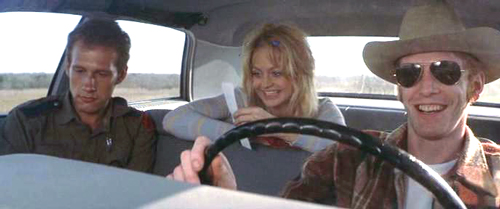
When we college film students saw The Sugarland Express we were green with envy. Spielberg had successfully translated his Hitchcockian visuals-take-precedence style to the big screen, and he used the Panavision format better than almost anybody. The early '70s were the era of the writer-director who made up his 'genius' movie as he went along, thinking European instead of delivering slick Hollywood production values. Spielberg brought his fixation on technical screencraft straight from the Truffaut: Hitchcock book, and made every shot count. No wonder the industry took him seriously -- at age twenty-seven or so he was using the tools of the trade better than anybody. Because Sugarland was another road picture with cars, detractors sniped that he was just a director of traffic. But who had directed cars this creatively? His designers and camera people helped him deliver many arresting shots; it was also the first time Spielberg worked with composer John Williams.
Did a strong personal theme come through? Was 'Stevie' an auteur? Maybe not, but he was definitely a screen communicator. We feel very strongly for Goldie Hawn and William Atherton, even if Spielberg backs away from making a statement about injustice. Sheriff Ben Johnson's 1,001 prowl cars are an absurd harbinger of doom but not a critique of law enforcement. Playing a very foolish, stupid character, Goldie Hawn communicates frustration and panic, and Spielberg's expressive visuals do the rest. A traumatized mother throwing stuffed animals out of a getaway car should be corny as all get-out, but Spielberg pulls it off. When Spielberg revived Hitchcock's Vertigo smash zoom, he became the ultimate film student film director.
Sugarland didn't do great theatrically. I know he was very proud of it, and was always grateful to people like Joe Alves for helping to pull it off. But Spielberg knew that two non-hits in a row would stall anybody's directing career, and he certainly hadn't 'established' himself yet. His next show would be a gamble, but it would also make sure it was perfectly suited to his strengths.
The Sugarland Express also benefits greatly on Blu-ray. The added sharpness of HD helps with the many wide shots, and the enhanced contrast range strengthens images with dark figures silhouetted against police lights or sun glare. We want to go frame-by-frame to study the shot of a TV camera van overturning and tossing its passengers directly at the camera -- we have a difficult time believing nobody got hurt on that shot. Universal never found a way to get a mass audience behind Sugarland, which probably taught Spielberg to be wary of stories that couldn't be described in one sentence. Today we also admire the great performance by William Atherton, whose career was run off the highway by playing a villain too well in Ghostbusters. The only extra is a trailer.
I reviewed an older disc of The Sugarland Express at DVD Savant in 2004. The review is here.
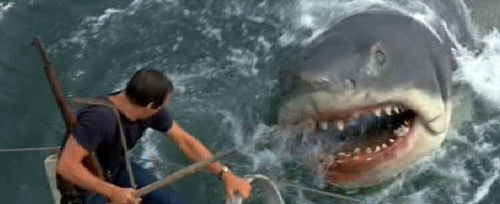
What did Spielberg bring to the movies with Jaws? I say it was self-confidence and a full command of the screen. Jaws is a classy family-oriented film with sincere emotions, that also works like an exploitation picture. It is high adventure, with thrills that are psychologically healthy. Accepting the existence of a slightly oversized shark does not require us to suspend our disbelief completely -- it's not like it's a radioactive dinosaur or The Creature from the Black Lagoon -- although Jaws does share much in common with that movie, both structurally and in the way of Jack Arnold- style 'Boo!' effects. Jaws co-opts the horror, sci-fi, and ocean-going adventure genres. It also seems connected to the decline of the gritty '70s crime film: ex- NYPD cop Roy Scheider unloads his .357 Magnum into the monster, but the damn thing soaks up the bullets as if it hadn't been touched. Oh, and the old-salt character hammed up so well by Robert Shaw gives us Ahab, The Old Man and The Sea and Long John Silver, to boot.
Thanks to a script that alternates nervous shocks with equally nervous laughs, some major technical help, and Spielberg's own instincts, Jaws handed audiences some astonishing jolts back in 1975. Verna Fields editorial and John Williams' musical contributions generate so much suspense that it didn't matter that the shark wasn't perfect. I can tell you how Jaws came across the first time in Century City in the summer of 1975: GREAT. Everything worked. The audience behaved as if their own lives were at risk. And the wild thing was that it was FUN to be scared this way, when the threat was so basic. Like Psycho, Jaws can't possibly play the same way it did when it was new. But a lot of people remember it as the show that sent them out of theater both laughing and a little bit nervous, still feeling the rush of adrenalin.
Jaws on Blu-ray looks very clean, with its color scheme slightly optimized. In the early 1980s Spielberg discovered that its negative had begun to fade and joined with Martin Scorsese to petition Kodak for more stable film stocks. Perhaps more work was required to restore hues seen in original prints. Like Sugarland, it makes very precise compositional use of the film frame. Watching it when knew, I realized why Spielberg and other young directors preferred the 'Scope format -- with no 'protected' areas above or below the image, a director could be certain where the top and bottom of the frame would always be. Panavision wasn't perfect for all movies, but it at least made it possible to be rigorous with one's compositions.
The disc appears to carry all of the older featurettes and production extras -- a long list of them. The copy of The Making of Jaws here appears to be the same as appeared on the 30th Anniversary DVD from 2005 -- it's 122 minutes in length. I believe the original cut was longer. Most film fans know about the difficulties Spielberg encountered trying to shoot at sea with a malfunctioning robot shark, but the making-of story is a wild one -- the whole unit was almost shut down, and the director sent back to TV work. Some guardian E.T. must have been out there helping Spielberg make the right decisions.
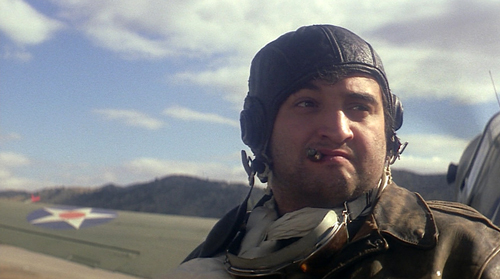
What does a filmmaker do when he knows he should have Hollywood by the tail, yet must still deal with a power structure that seeks to 'rein him in?' Jaws made Spielberg the top director in the world, and Close Encounters proved that he could direct a groundbreaking special effects epic and still appeal to everyone. Yet I was personally present at a meeting in which Columbia's head of production said that Spielberg had run wild with Close Encounters: "This time we'll make him play the game by the rules." Nope, it was Spielberg's turn to prove that from now on he would run the show his way. He mostly ignored the producer and spent the better part of two years in production. The effects crews were allowed to do a major film with traditional techniques, but few budget limits -- gigantic miniatures and complex live-action effects, all done so that Spielberg could film them any way he wanted, from any angle.
1941 did get out of control in that its fairly modest original story was expanded in size and scope up and away from its modest Popeye- like love story of a Zoot-Suiter trying to take a USO babe to a soldiers-only dance. The script ballooned to create bigger parts for Saturday Night Live stars. A wild pilot character used as a running gag became a major role for John Belushi. Bigger was better, and in the philosophy of executive producer John Milius, louder and more explosive was better too. Suddenly it seemed that every scene ended with an explosion, gunfire, or a major action sequence. Writers Robert Zemeckis and Bob Gale delivered good material for every new writing challenge while Spielberg's crew hammered out 200-plus filming days. The budget soared to permit the company to crash full-sized aircraft, blow up enormous miniatures, and stage a major dance sequence that becomes a race riot. The fighter plane belly-landing in the middle of Hollywood Blvd wasn't quite perfect? Let's shoot it again!
1941 is bigger and more technically complex than any comedy epic filmed before: Casino Royale, It's a Mad, Mad, Mad, Mad World, The Russians Are Coming, The Russians Are Coming, The Great Race. Any individual sequence is brilliant, grandiose, technically as good as anything Spielberg has done. But the show lost its focus when the 'guest stars' in all the subplot stories were given more emphasis than the main "Popeye" group, a core of actors from I Wanna Hold Your Hand. A big exception is the great Wendie Jo Sperber, whose brassy and broad comedics steamroll everything in her wake.
The show's nonstop slapstick, grandiose demolition, constant screaming and ear-jolting explosions had a slight drawback: they exhausted audiences, especially those not subscribing to the John Milius credo that big bangs make anything funny. By rushing too many scenes, editor Michael Kahn rushes some of the comedy, making the central story of Wally & Betty (Bobby Di Cicco & Dianne Kay) seem an inconvenience. The early diner scene introducing Wally and Dan Aykroyd's tank crew is such a blur that it just collapses, making no impact and getting the movie off on the wrong foot.
1941 on Blu-ray is a great improvement over earlier transfers. All that fog 'n' filter cinematography didn't translate well to NTSC video, and left the image looking mushy. HD can resolve the delicate haze and colors and makes the show look attractive again. That, and the heightened detail allows one to take in the complex action in the wide shots of riots, and stunt work that seems to be injuring people right and left (which is not far from the truth).
Before its release in 1979 the film was slashed by almost thirty minutes, removing scenes throughout the picture. A longer cut was released in so-so quality on an old DVD. The new Blu-ray contains both the theatrical and this superior extended preview cut, fully restored for HD. Considering the new respect being afforded vintage gigantic Hollywood comedy epics (especially Mad, Mad World) there's every reason to hope that more viewers will discover this show. It's no longer fashionable to dismiss it out of hand -- perhaps because the range of entertaining comedies today is so narrow. Perhaps someday a new film category will be marketed, not pre-Code, but "pre-CGI."
Ported over from the 1995 laserdisc are a multi-part making-of docu, a stack of deleted scenes, some production stills, two teasers and a trailer.
I wrote a DVD Savant article about 1941's special effects back in 1999: A Giant Comedy, Only with Guns! It's partly a review as well.
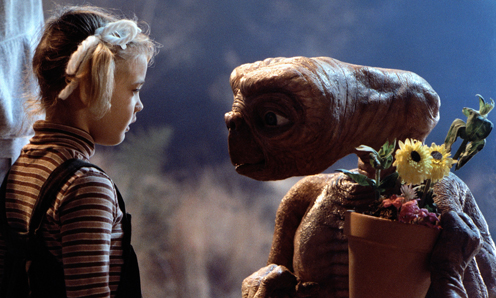
With E.T. The Extra-Terrestrial Spielberg steered back from the genre action of Raiders of the Lost Ark and the horror thrills of Poltergeist to make the family film that would claim the entire decade as his personal career territory. Movie-wise, the Reagan revolution was a return to sappy family values of 1940s MGM movies; and this show imight as well be an updated equivalent of Lassie Come Home. Parents easily overlooked dialogue like "penis breath" (can't have a "G" rating, no way) and embraced Spielberg's movie about a boy and his pet Eraserhead from the stars. In E.T. Spielberg drops any vestige of cynicism or satire. He applies his potent audience manipulation methods like a brainwashing expert trained in the Disney Arts. The concentration is on excellent, natural work with child actors. The kids are cute, smart, stubborn, independent and loyal as needed, and in general regarded with more respect and awe than we've seen since the old '38 Adventures of Tom Sawyer. Spielberg made his 'nice' alien story even more squeaky-clean dreamy with the visual of a boy riding a bicycle through the sky. That carefully calculated knockout visual immediately focuses audience identification. 2
Some of the movie's elegant set pieces are among the director's best work, such as the Norman Rockwell moment of the vicariously drunk Elliott kissing a kindergarten classmate like she was Maureen O'Hara in The Quiet Man. But the film's warped sentiment gets terribly out of hand with the intertwined fate of Elliott and E.T. Remember Casablanca's dialogue line about personal problems not adding up to "a hill of beans in this crazy world"? Spielberg often pushes far too hard with his storytelling to convince us that the plight of his key characters should override any other concern in the universe. The film's most traumatic image is the sight of Elliott discovering that his negligence, or lack of faith, has resulted in E.T. ending up near death in a ditch, white and pasty, like that pet turtle that starved to death when you were a kid because you forgot about it. It's storytelling overkill. I think I react negatively because I feel no connection in E.T. with the real nature of love or faith. Many old movies aspired to create this forced goo-goo emotionalism, but few of their makers could equal Spielberg's superior talent for persuasion. I've asked other viewers that don't like E.T. what they think, and they're usually much less conflicted about it -- to them it's just a corny movie.
I have no illusions about the consensus opinion on E.T. The Extra-Terrestrial, which is of course one of the most beloved movies ever. It also remains one of Spielberg's biggest successes.
E.T. The Extra-Terrestrial on Blu-ray is very handsome. Allen Daviau's very warm cinematography makes Elliott's rooms where E.T. hides seem like a kid's hideout. Some of the special effects of the egg-like E.T. spaceship are grainy, but they always were; Spielberg focused on the intimate story, spent less money than usual and made an incredible fortune. Earlier special editions of this show went overboard with the extras, as all America couldn't learn enough about how their favorite film was made. I have no idea if they're all here, but it's very possible.
One final note confirms Steven Spielberg as a class act, in terms of realizing the responsibilities of his chosen work. After performing some well-publicized digital alterations to E.T. for subsequent releases, he decided that maintaining the original film is more important and has restored the show to its 1982 release version. Those complex E.T. facial expressions are difficult to be sure of, but I saw firearms in the last scenes, and no added embellishments to the spaceship. Bravo!
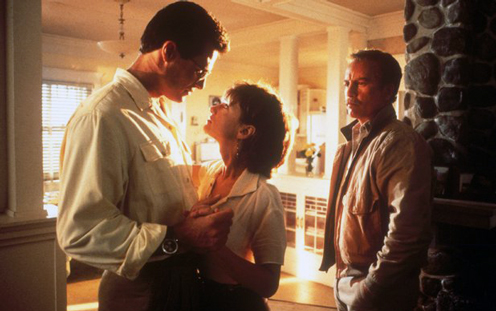
All of a sudden we're deep into the 1980s. No longer a mere movie director, Steven Spielberg is by this time an institution, an industry force as influential as any studio. They vie for his attention, giving him free production facilities in the hope that they'll be chosen to distribute whatever he comes up with. Spielberg founds his own company and begins producing more and bigger pictures in addition to his own, establishing a commercial track record that's somewhere between pretty good and terrific.
With success came critical slams and industry grumblings. Some Academy voters resented Spielberg, but the reason seemed to be jealousy. Art filmmakers shunned him as a lowbrow mass-marketer selling Walt Disney gee-whiz and Cecil B. De Mille grandiosity. He and George Lucas were blamed for killing off the 'golden decade' of '70s filmmaking. That's a dumb conclusion, yet it's natural to ascribe authorship of a trend to its most successful proponent. Some of Spielberg's Reagan-era films did seem to substitute John Williams music and sense-of-wonder push-in camera moves for real emotions and real magic.
The Spielberg 'magic' seemed woefully out of touch in 1989's Always, which is perhaps Spielberg's lowest low point, with Hook and maybe The Terminal in the same neighborhood. They can't all be winners, but in this turkey the brilliant director's best intentions really curdle the blood (this is not exactly a minority opinion). Spielberg was a huge fan of Dalton Trumbo's A Guy Named Joe and had praised it once or twice on the set of 1941. The original movie is perhaps the most extreme example of WW2 fantasy sentiment; it's a film blanc that gets a little reckless with pseudo-spiritual emotions. The acting by Spencer Tracy and Irene Dunne is efficient tear-jerking stuff, but the air of morbid romanticism is definitely a matter of personal taste.
Always transposes the "romance/death/intervention from beyond the grave" setup of Joe from the South Pacific to pilots that fight forest fires. Not even The Exorcist rubs me the wrong way quite so badly. The writers aim for a Howard Hawks- like sentimental film about pros doing dangerous work, but every word that comes out of their mouths is a forced 'cool' line or smart remark, something a hack screenwriter would come up with. The 1940s originals Spielberg loves created 'movie magic moments', but Always tries to make every dialogue bit and gesture into a magic moment. Even with the wonderful Holly Hunter involved, nothing works. Everything is overdone, cloying, obvious. Richard Dreyfus comes off as insufferably obnoxious, and the Film Blanc whimsy is oppressive. Not even the adorable Audrey Hepburn can cut through the falsity. The recreation of old-time movie sentimentality can't be storyboarded or willed into existence. The shudder-inducing Always makes E.T. suddenly seem much, much better, a sincere statement of Spielberg's feelings. If Always is your favorite picture and I'm the Grinch who Hates Sweet movies, a thousand pardons, mille regretti.
Um ... some of the aerial effects and stunts are pretty neat ... if you believe that every time a plane goes into the air, some emotionally devastating crisis must develop. I'd think that the valiant men who do this kind of work would be offended to see themselves portrayed as flippant daredevils and jolly good-old-boy sidekicks.
Always on Blu-ray looks especially clean and sharp -- viewers will be pleased by the flawless picture and the clear audio that highlights every John Williams 'spiritual crisis' effect. I remember the show having some pretty good featurettes, but the only extra here is a trailer.
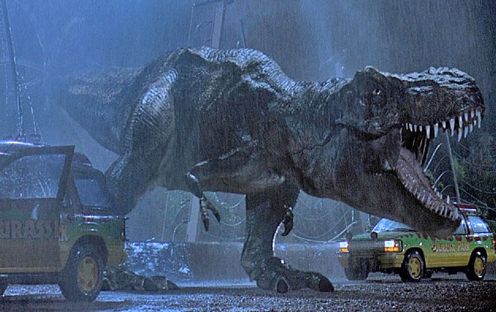
I gave Jurassic Park an enthusiastic review in an older large boxed set and the movie is still too special not to admire. Kids universally adore dinosaurs, and Spielberg's desire to do a movie about them was goosed by Michael Chrichton's nifty semi-plausible rationale to excuse the existence of living prehistoric animals. Then in mid-production ILM took the technological leap to generate full photo-real CG dinos, and the reign of computer effects kicked into high gear.
The movie itself avoids stacking up too many cute 'family' touches, and we basically like the characters. The theme-ride plot is on the thin side, and somewhat frustrating in the way that such a neat setup (Dino Country Safari on a lost island) immediately undergoes a Westworld- style systemic catastrophe. But that's the way Spielberg conquered the Cinema Firmament: everything is fun and not a second is wasted on anything that isn't "the good stuff" capable of riveting the attention of a five year-old. The saving grace in 1993: it's the dinosaurs, stupid. They're spectacular.
We're told that CGI effects account for fewer of the dinosaur shots than we might think, but only a few shots stick out as Beta testers for the process. Jurassic Park is indeed a Digital Revolution landmark, and making it required a big thinker with access to deep pockets. Although the grumblers will always grumble, Spielberg's Jurassic Park takes ten steps past what previous dinosaur movies ever dreamed of being able to do. Ray Harryhausen might try to pull off one or two shots per film in which his stop-motion camera trucks along with a dinosaur in full view. Spielberg can suddenly pan, tilt, and truck while dinos run past the camera like deer. Everything can move in depth. Nobody has to poke long sticks at monsters any more. CGI can break all the rules we older fans of monster-dom had learned to accept. It's unnatural, I tells ya.
Jurassic Park appears to be the same encoding as an earlier Blu-ray release from 2011. It's of course in perfect shape in every way. The list of extras seems to align pretty closely with what's on the older special edition. The story of how the show switched from stop-motion creatures to CGI beasts is really interesting. Since the days of Close Encounters the experts knew that computers would take over, and I remember that some friends working at a newly-founded effects house enrolled in college programming classes even after working ten hours a day. Just the same Jurassic Park was the picture that made the truth inescapable. At least a dozen special effects specialties quickly became extinct. Anyone remember what 'optical line-up' was? I took a couple of weeks of training in it, at Future General.
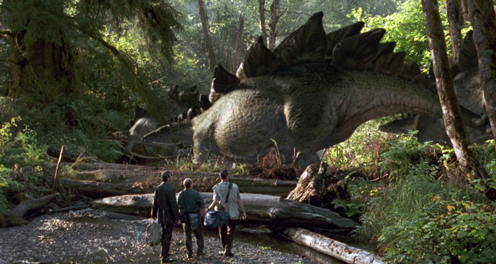
Jurassic Park is like Creature from the Black Lagoon in that its first sequel The Lost World: Jurassic Park gives the tropical monsters a brief opportunity to run amuck back on American soil. Spielberg thought enough of the project that he directed it himself, but it's sort of a play-safe affair that dishes up even more outlandish dino jeopardy and blames it all on (gasp!) a venal corporation. The prologue undermines expectations with the massacre of a family on a world cruise, when they pick the wrong beach to stop their private yacht for a picnic. Interestingly, a family that could vacation like this would have to be extremely, extravagantly wealthy... the Spielbergs, maybe.
As soon as the name stars show up, the dinosaurs must do a lot more work to chow down on unsuspecting tourists. The Lost World hands us a series of suspense set pieces, like when Jeff Goldblum and Julianne Moore's fancy vehicles are pushed halfway off a cliff, forcing them to climb to safety through the disorienting interiors . We also meet interesting characters like Pete Postlethwaite's big game hunter. This time the plot unfolds like a family-oriented Giallo, substituting dinosaurs for knives and razors. The dinosaurs are always fun but the suspense isn't really there -- we know that Goldblum's cute family folk aren't going to get a scratch, no matter how close those pesky Raptors get.
The sequence back in America starts well and gets a little confused. I will admit that I love one marvelous gag involving a doghouse, a chain and a mighty T-Rex let loose in San Diego's suburbia. It's worthy of Tex Avery and a gift to cynical critics of our millennial culture of dog worship.
The Lost World: Jurassic Park also appears to be exactly the same Blu-ray encoding as on the 2011 triple bill disc set; the long list of extras appears to have migrated with it. We can also see subtle improvements in the CG Image quality in the four years since the first JP outing; ILM clearly considered any Spielberg show to be one where their reputation was at stake. My review of an older Blu-ray of The Lost World: Jurassic Park is here.
Universal Home Entertainment's Blu-ray set Steven Spielberg Director's Collection is a quality product in all respects, from the formatting of the discs to the editorial choices on the illustrated insert booklet. It's easy to access the discs, and no chore to get the show running. Dozens of well-chosen images decorate the book-like multiple disc holder. The only illustration that throws me was a storyboard of two bi-planes in a dogfight. It has nothing to do with 1941. Has it perhaps wandered in from Ace Eli and Roger of the Skies?
A set this big must have required countless hours of QC work. Every show stays firmly in sync. I also checked the English subtitles throughout the set and all worked properly. The only drawback for consumers is that one must buy a pricey set to obtain something new or improved -- in this case the discs that are new to Blu-ray. But I have already seen the collection heavily discounted.
FYI, the set promotes the "Pocket BLU App, the latest way to set up a 'second screen' assisted viewing environment. I'd like to hear from readers that access this extra.
On a scale of Excellent, Good, Fair, and Poor,
Steven Spielberg Director's Collection Blu-ray
rates:
Movies:
Duel, Sugarland, Jaws, Jurassic Park: Excellent;
1941, E.T.: Very Good;
The Lost World: Jurassic Park: Good;
Always: Fair.
Video: all Excellent
Sound: all Excellent
Selected Supplements:
All Shows: Trailers
Duel: A Conversation with Director Steven Spielberg; Steven Spielberg and the Small Screen; Richard Matheson: The Writing of Duel; Photograph and Poster Gallery.
The Sugarland Express: Trailer only.
Jaws: The Making of Jaws; The Impact & Legacy of Jaws; The Restoration; Deleted Scenes and Outtakes; From the Set; Jaws Phenomenon.
1941: The Making of 1941; Deleted Scenes.
E.T. The Extra-Terrestrial: Deleted Scenes; Steven Spielberg & E.T.; The E.T. Journals; A Look Back; The Evolution and Creation of E.T.; The E.T. Reunion; A Discussion with John Williams; Special Olympics TV Spot.
Always: Trailer only.
Jurassic Park: Dawn of a New Era; Making Prehistory; The Next Step in Evolution; The Making of Jurassic Park; Original featurette ; Steven Spielberg Directs Jurassic Park; Hurricane in Kauai; Phil Tippett Animatics: Raptors in the Kitchen, T-Rex Attack; Before and After the Visual Effects; Production Archives: Photographs, Design Sketches and Conceptual Paintings.
The Lost World: Jurassic Park: Finding the Lost World; Something Survived; Deleted Scenes; The Making of the Lost World; Original featurette; A Discussion with Author Michael Crichton; Before and After the Visual Effects; Production Archives.
Deaf and Hearing-impaired Friendly?
YES; Subtitles: English, French, Spanish
Packaging: Eight Blu-ray discs in book disc holder with color souvenir booklet, in heavy duty card sleeve.
Reviewed: October 12, 2014
Footnotes:
1. The other movie being shown that night was Matheson's The Incredible Shrinking Man. Matheson told us he hadn't seen it since it was new, hated it and never wanted to see it again. He later changed his mind.
Return
2. The "boy riding a bicycle through the sky" idea was once rumored among effects people as having been transferred and re-purposed from another screenplay Spielberg bought. I've never read a reliable corroboration of this, Can it possibly be true? I know I'm possibly spreading an unwarranted untruth here, but I'd honestly like to know.
Return
3. A Note from producer/screenwriter/director Bob Gale, 10.24.14:
Hey, Glenn! I knew you'd enjoy the remastered 1941 -- I thought it was glorious!
Just wanted to correct something: the extended version was never shown theatrically. There were 2 audience sneaks, one in Dallas and a 2nd one in Denver. I don't recall the actual running times, but neither version was much longer than 120 minutes (excluding end credits). Steven shot more stuff with Belushi after the 1st preview, including the bit where he actually boarded the sub. So he took stuff out after Dallas, and put other stuff in. The first appearance of the extended cut was when the movie ran on network TV (ABC as I recall). When the movie was scheduled to come out on laserdisc -- 1993, as I recall -- I suggested the added material be included, and (after a long search for it) it was. For the BD, Mike Matessino was instrumental in restoring the original score for the additional scenes. Mike was a prime mover on LaLa Land's CD of the 1941 score, and he'd found all the material that had been recorded. On the laserdisc and DVD releases (and on ABC), the music for the added scenes was cobbled together from other tracks. So the BD is the first time audiences can hear the correct score for the Dept. Store scene, the Ninja Tree scene, and the Wally shoots up the cop car scene.
Hope your life is good, Glenn, and I always enjoy your reviews.

Text © Copyright 2014 Glenn Erickson
See more exclusive reviews on the Savant Main Page.
The version of this review on the Savant main site has additional images, footnotes and credits information, and may be updated and annotated with reader input and graphics.
Return to Top of Page
|

